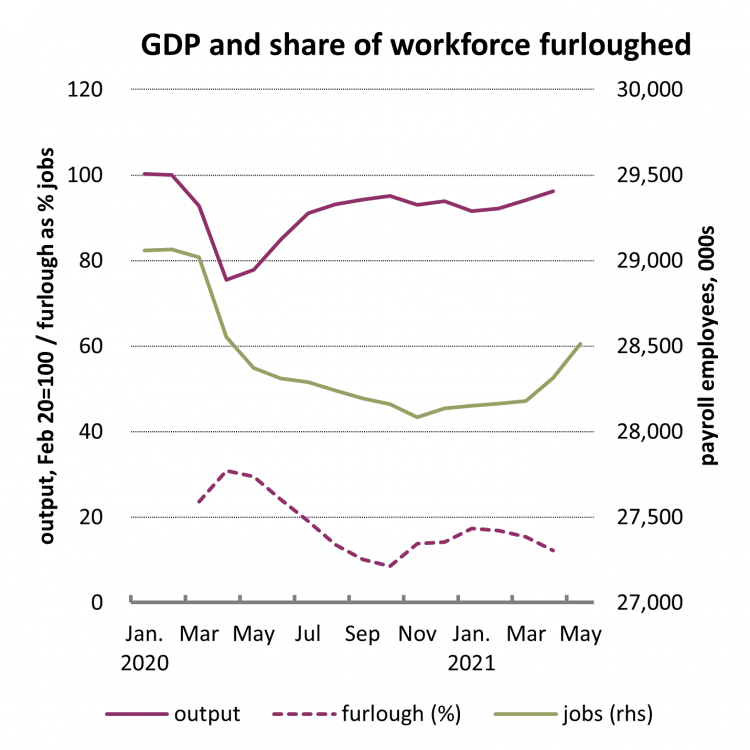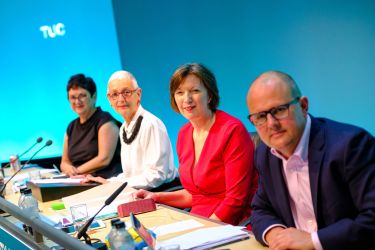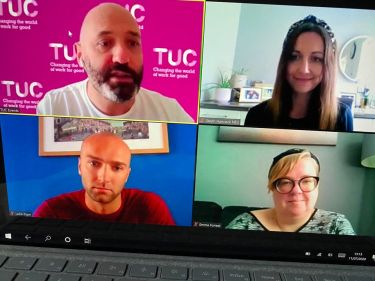General Council Report 2021
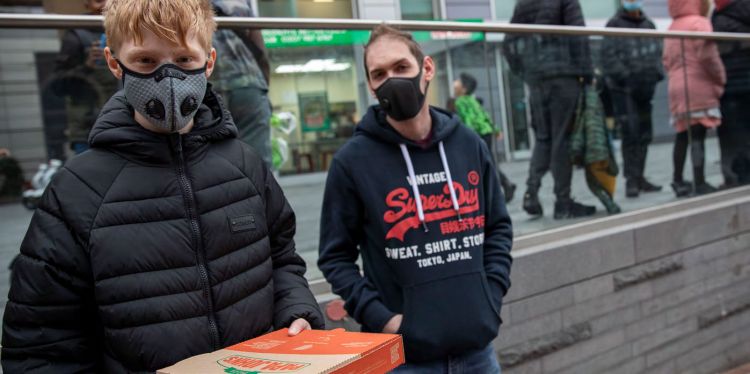
1.1 Introduction
This year has brought unprecedented economic challenges. But the trade union movement has fought to ensure that ordinary working people don’t bear the burden of the pandemic. We’ve campaigned for job protection, decent work, and higher pay. We’ve made the case for an industrial strategy to deliver better jobs, reforms to how companies work to put workers’ rights centre stage, and trade deals that protect workers’ rights in the UK and around the world. We’ve investigated new challenges to working life from the use of new technology. And we’ve fought for decent social protection and pensions, and against the exploitation of migrant workers.
1.2 The economy and labour market in 2020/21
The impact of the pandemic on the economy is unprecedented. The TUC has focused on monitoring the impact on working people, and lobbying for better government support (including through the furlough scheme, as outlined in Section 1).
In November, we held an online roundtable with Andrew Bailey, governor of the Bank of England, and Andy Haldane, deputy governor, to discuss union concerns about the economy.
Figure 1 shows the level of GDP over the past year and the share of employees on furlough. At the peak of lockdown in April 2020, just over 30 per cent of employees were furloughed, with GDP down by 25 per cent. The economy revived rapidly as lockdown was relaxed, but the lockdown in November pushed furlough rates back up to 17 per cent. However, GDP declined by only 3.7 per cent between October 2020 and January 2021. As this lockdown was eased and the share of workers on furlough fell to around 12 per cent, GDP has picked up and is now within 4 per cent of the pre-pandemic level.
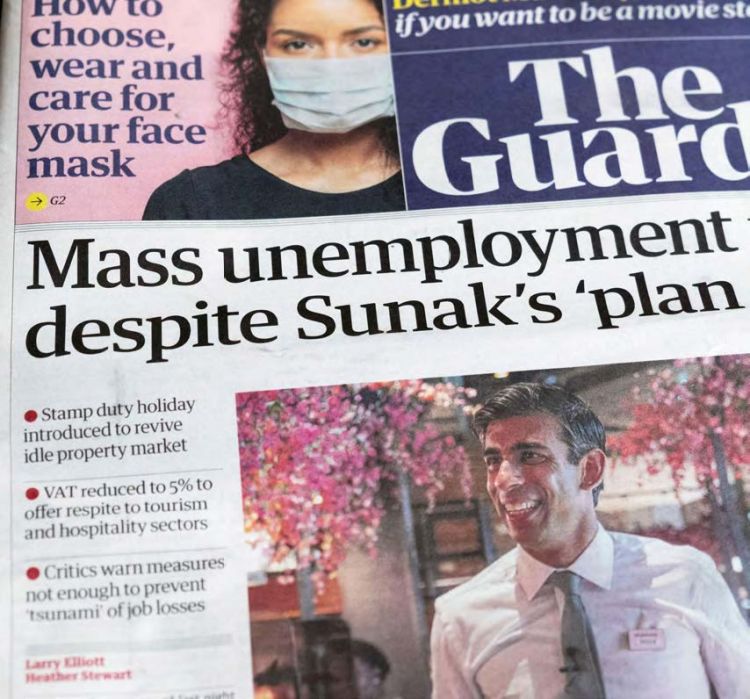
Employment fell by nearly one million between February and November 2020 (a fall of 3.4 per cent). While 430,000 jobs were then created through to May 2021, overall employee jobs are 550,000 below the pre-pandemic level. On the Labour Force Survey measure, unemployment rose by 360,000 to peak at 1,700,000 in the period between November 2020 and January 2021. It then fell back by 90,000 to 1,610,000 in the period between February and April 2021.
Across the economy, just over two jobs have been created for every five lost. But the areas where jobs have been created are not generally those where they have been lost. Jobs have increased only in public services and business services and administration, while across manufacturing, retail, hospitality and the arts, only one in eight jobs lost has been recovered. These are also the sectors where workers are most likely to be furloughed, and there is a significant risk of rising unemployment if the government winds down the scheme prematurely. The TUC has campaigned for job protection to remain in place as long as needed, alongside significantly more job creation.
The furlough scheme and other subsidies to households and business have required a significant increase in government spending, and lower levels of economic activity have meant reduced tax revenues. Public borrowing has inevitably increased – from £57bn in 2019/20, to £299bn in 2020/21. But these costs are smaller and shorter-lived relative to the costs of other exceptional periods, such as the Second World War.
There is now a strong economic consensus that the austerity seen after the financial crisis should not be repeated. The TUC will continue to campaign against unnecessary and damaging cuts to public spending and in favour of investment in a green recovery and public services.
As our A Better Recovery report argued: “We can do what the post-war generation did: grow our way out of this crisis and build a better life for everyone.”
2.4 Key worker pay
Guided by composites 10 and 11, the TUC has campaigned for a pay rise for our key workers. We used our budget submission to argue for an end to the public sector pay freeze, for pay rises that keep pace with the rising cost of living, and for a new minimum wage of £10 per hour.
TUC analysis showed falls in real pay of between 3.5 and 7.5 per cent for a range of key workers. We also raised concerns that many key workers in the private sector are engaged in delivering core public services, but won’t benefit from any pay offer made exclusively to directly employed staff.
Ahead of the budget, the TUC organised meetings with 33 MPs, attended by over 500 activists, to demand a fair pay rise for key workers. Over 60,000 people signed our petition demanding pay justice, while more than 2,400 trade unionists attended our Rally for a Workers’ Budget. Speakers included the then shadow chancellor, trade union leaders, and Michael Foster from the US, who talked about organising Amazon workers in Alabama.
After the budget failed to deliver, TUC General Secretary Frances O’Grady wrote to public sector pay review bodies, urging them to recognise and reward the efforts of key workers in public services. The TUC published analysis showing one million children in key worker households are living in poverty. Key worker families in the north-east have the highest levels of child poverty (29 per cent), followed by London (27 per cent), the West Midlands (25 per cent) and Yorkshire and the Humber (25 per cent).
The TUC also called for all key workers to have the dignity, security and safety of proper sick pay. We published analysis showing one in twelve key workers (some 788,000 people) did not qualify for statutory sick pay going into the pandemic – despite many of them being at greater risk of exposure to the virus.
2.5 Tackling insecure work
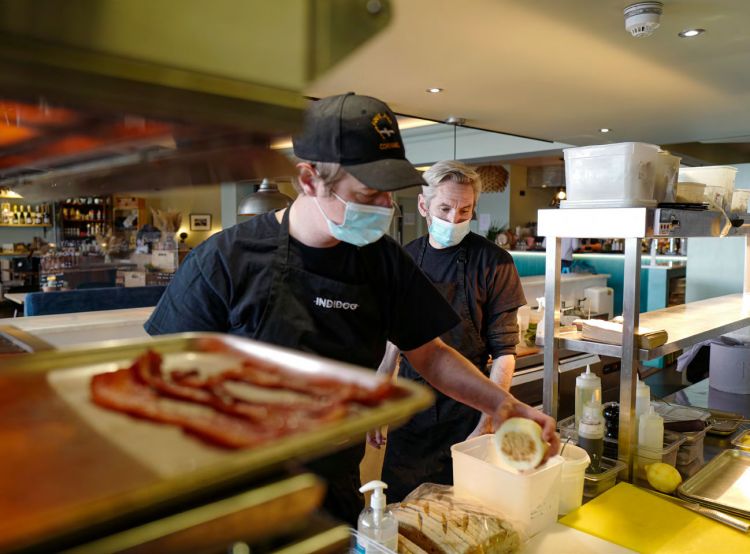
Our annual analysis showed that the UK still has 3.6 million insecure workers on zero-hours, agency or temporary contracts or in low-paid self-employment. The coronavirus pandemic has highlighted their vulnerability. Some saw work dry up overnight. Others felt compelled to work in unsafe conditions.
The TUC has continued to push for legislation to tackle insecure work. The 2019 Queen’s Speech promised an Employment Bill, and the TUC sought to engage with MPs from all parties on its priorities for legislation. These included a ban on zero-hours contracts, a trade union right of access to workplaces, a right to flexible working from day one, ethnicity pay gap reporting and stronger rights for parents to have time off in emergencies. In February, the TUC gave oral evidence to the Business, Energy and Industrial Strategy (BEIS) select committee on these priorities.
As yet, no Employment Bill has been presented and the TUC strongly criticised the fact that it was dropped from the 2021 Queen’s Speech. We continue to campaign for decent rights for all workers.
State enforcement of rights continues to be underfunded and neglected. In May, we published a TUC action plan to reform labour market enforcement. We showed that the UK would need an additional 1,797 labour market inspectors to meet the International Labour Organization benchmark of one inspector for every 10,000 workers. Just one in 171 workplaces had a safety or labour rights inspection during the pandemic.
This situation could put the UK in breach of the UK-EU Trade and Cooperation Agreement that requires each side to have an effective system of labour inspections.
Due to structural racism, Black and minority ethnic (BME) workers are particularly likely to be on insecure contracts. In a joint report called BME Workers on Zero-Hours Contracts with Race on the Agenda in June, the TUC showed that 4.5 per cent of BME women are on a zero-hours contract, compared to just 2.5 per cent of white men.
2.6 Tackling low pay
In line with composite 9, the TUC has continued to make the case for a real living wage, with an immediate increase in the minimum wage to £10 an hour. Following submissions by the TUC and affiliates, the government announced an increase in the national living wage (NLW) to £8.91 an hour from 1 April 2021. The TUC argues that higher increases will be needed to get the wage floor to 66 per cent of median wages by 2024.
We have also continued to argue that all age groups should be paid the same minimum wage. The government has expanded the age threshold for NLW eligibility from 25+ to everyone aged 23+, with further expansion planned to bring in everyone aged 21+.
As covered by resolution 35, the TUC and unions successfully lobbied government to bring in landmark legislation that means all seafarers in UK waters have been eligible for the minimum wage since 1 October 2020.
Our National Minimum Wage Enforcement Group has met quarterly, bringing together unions, advice agencies, BEIS, the Low Pay Commission (LPC), HM Revenue & Customs (HMRC), the Gangmasters and Labour Abuse Authority (GLAA) and the director of Labour Market Enforcement.
The TUC continues to contribute to the work of the Living Wage Foundation, promoting the voluntary living wage as a minimum rate for the lowest-paid workers. TUC General Secretary Frances O’Grady sits on the Living Wage Commission, which sets the rate of the living wage. The TUC has supported the Commission’s global living wage work, and its Living Hours campaign alongside a living wage.
2.7 The future of work, automation and AI
The TUC has continued work on the use of artificial intelligence (AI) to recruit and manage people at work.

The TUC carried out surveys to identify the types of technologies being used, and the impact on workers. In November, we published our research findings in Technology Managing People – the Worker Experience.
The TUC then commissioned a legal report from employment rights lawyers Robin Allen QC and Dee Masters, published alongside a TUC AI manifesto, Dignity at Work and the AI Revolution, which received widespread media coverage. This work was recognised by CogX (an organisation that runs an annual festival on AI and emerging technology), shortlisting the TUC for a global leadership award.
We have engaged with a wide variety of stakeholders including the Information Commissioner, the Equality and Human Rights Commission (EHRC), Acas, TechUK, Uber, the Centre for Data Ethics and Innovation (CDEI), academics including lawyers and technologists, the Department of International Trade, the Intellectual Property Office and the Office for AI, as well as MPs and Lords. In March, the TUC recorded a podcast with Hewlett Packard.
In April, the TUC opened the Employment Lawyers Association annual conference season with a seminar on AI at work. The TUC also contributed to the Carnegie Trust/CIPD tech advisory group.
In May, the TUC gave evidence at an All-Party Parliamentary Group inquiry on surveillance. We also contributed to the UCL/British Academy future of work project, while the TUC and UniEuropa gave a joint presentation for the Prospect/Data Justice Lab Challenging Tech event.
The CDEI invited the TUC to join its Recruitment and Workforce Management Advisory Panel and its AI Barometer online workshops. In June, the TUC took part in a CogX festival panel discussion hosted by the CDEI.
2.7 Social security
The TUC has continued to highlight the significant hardship that current sick pay policy causes, as well as the limits it places on the national coronavirus response.
We have shown how it excludes two million people who do not earn enough to qualify, and that benefit levels are inadequate at just £96 a week.
The TUC was highly critical of the self-isolation payment scheme introduced by the government in September 2020, six months into the pandemic. This offers a one-off £500 payment for those who need to self-isolate because of coronavirus, but cannot work from home. TUC analysis of 175 local authorities showed that demand for the self-isolation scheme easily outstrips allocated funding, leaving 7 in 10 applicants without support.
We have also looked at options for long-term reform on sick pay. The Fabian Society prepared a paper for the TUC that formed the basis for a roundtable discussion with unions and experts, and has now been sent to ministers and MPs. The TUC also met with the Treasury and the Department for Work and Pensions (DWP) to push for reform, and held a briefing for MPs in July.
Our work has shown how the social security safety net has failed during the pandemic. For newly unemployed claimants, the basic rate of universal credit (UC) is worth only around a sixth of average weekly pay.
With UC not fit for purpose, the TUC set up a working group with unions to develop options for its replacement. We also published a report on the human suffering caused by the five-week wait for the first UC payment, based on a TUC survey of claimant experiences.
In response to composite 4, we have continued to play an active role in the End Child Poverty Coalition. The TUC carried out analysis showing how much families have lost as a result of freezes to child benefit coupled with changes to how benefits have been uprated since 2010. A joint report by the TUC and the Institute for Public Policy Research (IPPR) showed how an urgent government cash boost for children would improve their lives and prevent up to 700,000 from living below the poverty line.
The TUC also raised the impact of the pandemic hit to family incomes on their access to housing in a report called
The Impact of the Pandemic on Household Finances, and called for an extension of the eviction ban to prevent homelessness, and a freeze on council tax debt repayment, in line with composite 5.
2.8 Industrial strategy, environment, energy, science and technology, sustainability, defence
Guided by composite 2 and resolution 14, the TUC has continued to make the case for a stronger, greener, more innovative economy. Deputy General Secretary Paul Nowak and General Council member Sue Ferns have represented the TUC on the government’s Green Jobs Taskforce, advocating the policies and investment needed to meet climate targets, protect and create jobs, and improve job quality and inclusion. The Taskforce published its report in July 2021, adopting several TUC recommendations.
The TUC has offered new courses for union reps on climate action and just transition. Wales TUC has developed two new courses and published the toolkit Greener Workplaces for a Just Transition. TUC Northern and TUC South West held training events on greening workplaces, while environmental reps’ networks are active in TUC South West, TUC LESE and Wales TUC. We have also published online learning modules for reps to have conversations on climate change with employers.
In June, the TUC published Ranking G7 Green Recovery Plans and Jobs. The report (covered in print and broadcast media) shows that...
the UK lags well behind G7 peers when it comes to investing in green infrastructure and future-proofing energy-intensive industries.
The TUC has continued to press government for a balanced, green energy policy, and supported the union campaign to secure a future for Springfield Nuclear Fuels, as called for in emergency resolution 1.
Ahead of the COP26 UN climate talks in Glasgow, the TUC worked with the International Trade Union Confederation (ITUC) to advance the trade union movement’s priorities: just transition, global equity, and a jobs-rich green recovery.
TUC General Secretary Frances O’Grady represented the TUC on the government’s Made Smarter Commission, while Deputy General Secretary Paul Nowak and TUC Northern Regional Secretary Beth Farhat served on the IPPR’s Environmental Justice Commission, which reported in July. The Trade Union Sustainable Development Advisory Committee (TUSDAC) met bi-monthly, including a roundtable with the Green Jobs Taskforce.
TUC offices are active in regional climate action partnerships, including the Liverpool City Region Climate Partnership (TUC North West), Yorkshire & Humber Climate Commission (TUC Yorkshire and the Humber), and the North East Climate Coalition (TUC Northern).
2.9 Creative industries
Our work on the creative industries has been guided by composite 3 and resolutions 13 and 15.
The TUC has attended quarterly meetings of the Federation of Entertainment Unions, ensuring that our work complements that of unions in the creative sector. We continue to work together to press for support for self-employed workers, including improvements to the self-employment income support scheme (SEISS) and additional funding to help the sector through the crisis. And we have continued to push for the suspension of the minimum income floor in universal credit.
The deputy general secretary continued to represent unions on the DCMS Cultural Renewal Taskforce.
2.10 Pensions
The TUC has continued to be a leading advocate for the interests of working people in occupational pensions, and for retired workers.
We have coordinated the union response to public sector pensions challenges. This has included roundtables with Treasury officials to enable unions to influence the development of the McCloud remedy, addressing age discrimination in public sector schemes. TUC officers met the chief secretary of the Treasury to lobby on this, the impact of a proposed cap on public sector exit payments, and the suspension of the cost control mechanism that was due to deliver improved pensions across the public sector.
We have maintained our support for defined benefit schemes. The TUC has engaged with government and The Pensions Regulator (TPR) over proposed funding regulations that threaten the viability of open schemes. A number of General Council members met the TPR’s chief executive.
The TUC has focused on improving workplace pension provision for those on low pay. We have participated in work tackling the problems caused by having multiple small pension pots, addressing issues caused by the tax relief system, and developing a Living Pensions kitemark for employers. The TUC is also part of a TPR project to improve diversity and inclusion in pension scheme governance.
This year’s TUC pensions conference was held online in March and covered pension funds and a just transition, workplace pensions inequalities, collective defined contribution schemes, and the role of the state pension in reducing inequality.
The TUC continues to support the triple lock, which plays a vital role in increasing pensioner incomes. We published Extending Working Lives: Supporting older workers, a report that made the case for freezing the state pension age at 66, alongside better support for those currently unable to work until the state pension age.
2.11 Workers’ capital, corporate governance and executive pay
The TUC has called for conditionality for businesses accessing government support during the pandemic. Businesses should set out plans for fair pay and decent work, pay corporation tax in the UK, and suspend dividend payments to support jobs.
We argued that as well as improving audit practices, avoiding corporate failures like Carillion requires wider corporate governance reforms to improve the quality of boardroom decision-making.
Directors’ duties should require them to promote the long-term success of the company as their primary aim, giving workforce and stakeholder interests the same priority as those of shareholders. TUC polling shows that three in four people support this.
We have also called for the word ‘employee’ to be replaced with ‘workforce’ throughout the Companies Act, so that company law requires directors to take responsibility for and report on their whole workforce, not just their directly employed employees as at present. We secured the support of several other organisations for this campaign.
Senior policy officer Janet Williamson represents the TUC on the Financial Reporting Council’s Stakeholder Advisory Committee and the Wates Coalition, and is also a member of the Corporate Governance Committee of the Institute of Chartered Accountants in England and Wales (ICAEW).
The TUC has continued to coordinate Trade Union Share Owners (TUSO), an initiative bringing together union funds to collaborate over voting and engagement with companies. The TUC is an active member of the ITUC’s committee for workers’ capital.
2.12 Brexit
As set out in the General Council statement on an international recovery, the TUC used meetings with government, the shadow cabinet, MPs and peers to argue against the risk to jobs posed by a hard or no-deal Brexit.
In October, we published a report on how state aid should not be a sticking point in the negotiations, followed by a submission to government consultation on subsidies in March this year.
In November, the general secretary met the Irish Congress of Trade Unions (ICTU) to discuss the ongoing negotiations. In December, the TUC facilitated a meeting with Spanish unions UGT and CC.OO to coordinate joint actions in support of workers in and around Gibraltar.
When the new trade agreement with the EU was announced in December, the TUC argued that it would not protect jobs and would put rights at risk. We published a 10-point plan analysing the deal, and setting out how to address the threats it poses.
The TUC provided regular briefings on the negotiations and an analysis of the outcome to the Executive Committee, union international officers, and individual unions on specific aspects of the deal.
The TUC met with the EU Commission to press for labour clauses in the deal. We also met MEPs and government to argue for the establishment of a domestic advisory group, including a trade union role monitoring the agreement. These meetings were facilitated by the European Trade Union Confederation (ETUC), where the TUC is represented on a taskforce to oversee the deal.
The general secretary met Lord Frost, the minister with responsibility for Brexit implementation, where among other issues she pressed the importance of upholding the Good Friday Agreement and investing for peace.
The TUC has engaged with ETUC, the EU Commission and BEIS to seek changes to the EU’s and UK’s respective guidelines on European Works Councils, so that UK representatives would not be excluded.
2.13 Trade and trade deals
Our work has been guided by the General Council statement on preventing unemployment and resolutions 3 and 5. The TUC has campaigned with international union partners against trade deals that threaten workers’ rights or public services, or that include non-transparent courts. The TUC signed statements with trade union centres in Australia, New Zealand and Norway to highlight these concerns. The general secretary has met with the Secretary of State for International Trade on a number of occasions.
Through TUC Aid’s project with the East African TUC, supported by the TUUT Charitable Trust, the TUC has developed advocacy with the trade union centre in Kenya to raise concerns about the UK-Kenya trade deal signed in November.
In January, the TUC signed a statement with trade unions in Turkey calling for the UK-Turkey trade deal to be suspended due to human and labour rights abuses taking place in Turkey.
The TUC has advocated for unions to be involved in trade negotiations. The government agreed to include trade unions on Trade Advisory Groups, which are consulted on the text of trade negotiations. The government also created a Trade Union Advisory Group chaired by Minister for International Trade Ranil Jayawardena.
The TUC has advocated for new World Trade Organisation (WTO) rules to promote workers’ rights and ensure equitable access to Covid vaccinations. In May, the TUC wrote to trade secretary Liz Truss with the ITUC, TUAC and trade unions from G7 countries calling on the government to support a waiver to WTO intellectual property rules to enable Global South countries to produce low-cost vaccines.
In May, the TUC held a roundtable with Shadow Trade Secretary Emily Thornberry on building a workers’ trade agenda. This brought together members of the shadow cabinet with unions from the US, Europe and Colombia, and the shadow trade team has regularly raised the TUC’s concerns in parliament.
In June, the general secretary met with US Trade Ambassador Katherine Tai to discuss a potential UK-US trade deal, and a worker-centred trade agenda.
The TUC developed advocacy around the eight freeports announced in March, to ensure they do not threaten workers’ rights, displace good jobs or lead to tax evasion.
The TUC continues to develop joint advocacy with other civil society groups. In June, we released a statement with the International Chamber of Commerce, the CBI and others calling for trade deals to enforce international labour conventions, protect public services and promote the UN’s sustainable development goals.
2.14 Migration
In line with the General Council statement on a global recovery, the TUC has campaigned against xenophobic narratives that divide workers and drive down conditions for all. In May, the TUC wrote to the home secretary to oppose proposals preventing asylum seekers claiming protection in the UK. These plans go against the UN refugee convention and would force more asylum seekers into informal employment and exploitation.
The TUC opposed the Immigration and Social Security Coordination Bill for denying EU citizens the right to work and social security support, concerns raised by the shadow home affairs team in parliament.
Our representation on the Home Office’s National Advisory Group enabled us to raise concerns about EU citizens with only ‘pre-settled’ status facing an increased risk of discrimination by employers and losing their legal status. The TUC updated a guide for reps to support EU members concerned about their status.
In February, we ran a course for reps and officers with the European Trade Union Institute (ETUI) on organising and empowering undocumented migrants.
In March, the TUC wrote to the home secretary with Anti-Slavery International, the ITUC, Unite, the Voice of Domestic Workers and Kalayaan calling for a reformed overseas domestic workers’ visa to enable domestic workers to change employers and escape abuse.
2.15 Decent work and supply chains
The TUC continues to advocate for decent work, equality and progress on meeting the UN sustainable development goals. We opposed cuts to UK aid, and have engaged with the UK government to call for aid to deliver decent jobs.
In December, the TUC organised a meeting for African sister centres with Labour’s shadow teams, chaired by the TUC president. In April, we organised a session for affiliates and sister centres with Labour on their UN review work.
TUC Aid projects continue to support the delivery of the TUC’s strategy. Trustees met virtually in October, March and July. Current projects focus on: building the capacity of East African trade unions to advocate for trade deals that deliver decent work; supporting Guatemalan banana workers’ union SITRABI to establish new unions; supporting trade union action to tackle gender-based violence in Latin America and the Caribbean; conducting research into human and trade union rights violations in Eswatini; and tackling gender-based violence in Iraq. A breakthrough at the ILO means that 2016 policy on decent work in supply chains is advancing, with a further report expected in March 2022.
We are also using our international experience to support unions to develop a ground-breaking agreement between them, brands and suppliers linked to the Leicester textiles industry.
Stay Updated
Want to hear about our latest news and blogs?
Sign up now to get it straight to your inbox

